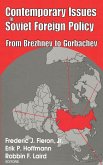Rethinking Foreign Policy Analysis (eBook, ePUB)
States, Leaders, and the Microfoundations of Behavioral International Relations
Redaktion: Walker, Stephen G.; Schafer, Mark; Malici, Akan
51,95 €
51,95 €
inkl. MwSt.
Sofort per Download lieferbar

26 °P sammeln
51,95 €
Als Download kaufen

51,95 €
inkl. MwSt.
Sofort per Download lieferbar

26 °P sammeln
Jetzt verschenken
Alle Infos zum eBook verschenken
51,95 €
inkl. MwSt.
Sofort per Download lieferbar
Alle Infos zum eBook verschenken

26 °P sammeln
Rethinking Foreign Policy Analysis (eBook, ePUB)
States, Leaders, and the Microfoundations of Behavioral International Relations
Redaktion: Walker, Stephen G.; Schafer, Mark; Malici, Akan
- Format: ePub
- Merkliste
- Auf die Merkliste
- Bewerten Bewerten
- Teilen
- Produkt teilen
- Produkterinnerung
- Produkterinnerung

Bitte loggen Sie sich zunächst in Ihr Kundenkonto ein oder registrieren Sie sich bei
bücher.de, um das eBook-Abo tolino select nutzen zu können.
Hier können Sie sich einloggen
Hier können Sie sich einloggen
Sie sind bereits eingeloggt. Klicken Sie auf 2. tolino select Abo, um fortzufahren.

Bitte loggen Sie sich zunächst in Ihr Kundenkonto ein oder registrieren Sie sich bei bücher.de, um das eBook-Abo tolino select nutzen zu können.
Rethinking Foreign Policy Analysis presents the definitive treatment to integrate theories of foreign policy analysis and international relations-addressing the agent-centered, micro-political study of decisions by leaders and the structure-oriented macro political study of state interactions in an international system.
- Geräte: eReader
- mit Kopierschutz
- eBook Hilfe
- Größe: 3.57MB
Andere Kunden interessierten sich auch für
![Strategy and Politics (eBook, ePUB) Strategy and Politics (eBook, ePUB)]() Emerson NiouStrategy and Politics (eBook, ePUB)94,95 €
Emerson NiouStrategy and Politics (eBook, ePUB)94,95 €![Research and International Trade Policy Negotiations (eBook, ePUB) Research and International Trade Policy Negotiations (eBook, ePUB)]() Research and International Trade Policy Negotiations (eBook, ePUB)50,95 €
Research and International Trade Policy Negotiations (eBook, ePUB)50,95 €![Rethinking Foreign Policy (eBook, ePUB) Rethinking Foreign Policy (eBook, ePUB)]() Rethinking Foreign Policy (eBook, ePUB)53,95 €
Rethinking Foreign Policy (eBook, ePUB)53,95 €![Foreign Policy Analysis (eBook, ePUB) Foreign Policy Analysis (eBook, ePUB)]() Chris AldenForeign Policy Analysis (eBook, ePUB)46,95 €
Chris AldenForeign Policy Analysis (eBook, ePUB)46,95 €![The Politics of China's Accession to the World Trade Organization (eBook, ePUB) The Politics of China's Accession to the World Trade Organization (eBook, ePUB)]() Hui FengThe Politics of China's Accession to the World Trade Organization (eBook, ePUB)0,00 €
Hui FengThe Politics of China's Accession to the World Trade Organization (eBook, ePUB)0,00 €![Feminist Foreign Policy in Theory and in Practice (eBook, ePUB) Feminist Foreign Policy in Theory and in Practice (eBook, ePUB)]() Stephenie FosterFeminist Foreign Policy in Theory and in Practice (eBook, ePUB)40,95 €
Stephenie FosterFeminist Foreign Policy in Theory and in Practice (eBook, ePUB)40,95 €![Contemporary Issues in Soviet Foreign Policy (eBook, ePUB) Contemporary Issues in Soviet Foreign Policy (eBook, ePUB)]() Contemporary Issues in Soviet Foreign Policy (eBook, ePUB)52,95 €
Contemporary Issues in Soviet Foreign Policy (eBook, ePUB)52,95 €-
-
-
Rethinking Foreign Policy Analysis presents the definitive treatment to integrate theories of foreign policy analysis and international relations-addressing the agent-centered, micro-political study of decisions by leaders and the structure-oriented macro political study of state interactions in an international system.
Dieser Download kann aus rechtlichen Gründen nur mit Rechnungsadresse in A, B, BG, CY, CZ, D, DK, EW, E, FIN, F, GR, HR, H, IRL, I, LT, L, LR, M, NL, PL, P, R, S, SLO, SK ausgeliefert werden.
Produktdetails
- Produktdetails
- Verlag: Taylor & Francis eBooks
- Seitenzahl: 350
- Erscheinungstermin: 26. Januar 2011
- Englisch
- ISBN-13: 9781136852442
- Artikelnr.: 42983599
- Verlag: Taylor & Francis eBooks
- Seitenzahl: 350
- Erscheinungstermin: 26. Januar 2011
- Englisch
- ISBN-13: 9781136852442
- Artikelnr.: 42983599
- Herstellerkennzeichnung Die Herstellerinformationen sind derzeit nicht verfügbar.
Stephen G. Walker is emeritus professor of political science at Arizona State University. Akan Malici is assistant professor of political science at Furman University. Mark Schafer is professor of political science at University of Central Florida.
Part 1: Foreign Policy Analysis 1. Foreign Policy Analysis and Behavioral
International Relations Stephen G. Walker 2. Macropolitics and Foreign
Policy Decisions: The Billiard Ball Model of IR Stephen G. Walker 3.
Micropolitics and Foreign Policy Decisions: The Behavioral Model of IR
Stephen G. Walker 4. Quantum Politics and Operational Code Analysis:
Theories and Methods Stephen G. Walker Part 2: Foreign Policy Decision
Making 5. The United States and Rogue Leaders: Understanding the Conflicts
Akan Malici 6. Deceptive Bargaining and Nuclear Ambitions: Prospect Theory
and North Korea's Decision to Go Nuclear Kai He and Huiyun Feng 7. Small
Group Dynamics: The Psychological Characteristics of Leaders and the
Quality of Group Decision Making Mark Schafer, Jonathon Nunley, and Scott
Crichlow 8. Alliances and Their Microfoundations: France and Britain in the
9/11 Era Akan Malici Part 3: Foreign Policy Learning 9. Learning to Resist
or Resisting to Learn? The Operational Codes of Fidel Castro and Kim Il
Sung Akan Malici 10. Stability and Change in Belief Systems: The
Operational Code of George W. Bush from Governor to Second Term President
Jonathan Renshon 11. Experiential Learning by U.S. Presidents: Domestic,
International, and Psychological Influences in the Post-Cold War World
Samuel Robison 12. Cognitive Responses by U.S. Presidents to Foreign Policy
Crises: Belief Changes in Response to Positive and Negative Experiences B.
Gregory Marfleet and Hannah Simpson Part 4: Foreign Policy Dynamics 13.
Dueling with Dictators: Explaining the Strategic Interaction Patterns of
U.S. Presidents and Rogue Leaders Stephen G. Walker and Mark Schafer 14.
Binary Role Theory: Reducing Uncertainty and Managing Complexity in Foreign
Policy Analysis Stephen G. Walker 15. The Integration of Foreign Policy
Analysis and International Relations Stephen G. Walker. Appendix. Formal
Models of Symbolic and Strategic Interaction Stephen G. Walker
International Relations Stephen G. Walker 2. Macropolitics and Foreign
Policy Decisions: The Billiard Ball Model of IR Stephen G. Walker 3.
Micropolitics and Foreign Policy Decisions: The Behavioral Model of IR
Stephen G. Walker 4. Quantum Politics and Operational Code Analysis:
Theories and Methods Stephen G. Walker Part 2: Foreign Policy Decision
Making 5. The United States and Rogue Leaders: Understanding the Conflicts
Akan Malici 6. Deceptive Bargaining and Nuclear Ambitions: Prospect Theory
and North Korea's Decision to Go Nuclear Kai He and Huiyun Feng 7. Small
Group Dynamics: The Psychological Characteristics of Leaders and the
Quality of Group Decision Making Mark Schafer, Jonathon Nunley, and Scott
Crichlow 8. Alliances and Their Microfoundations: France and Britain in the
9/11 Era Akan Malici Part 3: Foreign Policy Learning 9. Learning to Resist
or Resisting to Learn? The Operational Codes of Fidel Castro and Kim Il
Sung Akan Malici 10. Stability and Change in Belief Systems: The
Operational Code of George W. Bush from Governor to Second Term President
Jonathan Renshon 11. Experiential Learning by U.S. Presidents: Domestic,
International, and Psychological Influences in the Post-Cold War World
Samuel Robison 12. Cognitive Responses by U.S. Presidents to Foreign Policy
Crises: Belief Changes in Response to Positive and Negative Experiences B.
Gregory Marfleet and Hannah Simpson Part 4: Foreign Policy Dynamics 13.
Dueling with Dictators: Explaining the Strategic Interaction Patterns of
U.S. Presidents and Rogue Leaders Stephen G. Walker and Mark Schafer 14.
Binary Role Theory: Reducing Uncertainty and Managing Complexity in Foreign
Policy Analysis Stephen G. Walker 15. The Integration of Foreign Policy
Analysis and International Relations Stephen G. Walker. Appendix. Formal
Models of Symbolic and Strategic Interaction Stephen G. Walker
Part 1: Foreign Policy Analysis 1. Foreign Policy Analysis and Behavioral
International Relations Stephen G. Walker 2. Macropolitics and Foreign
Policy Decisions: The Billiard Ball Model of IR Stephen G. Walker 3.
Micropolitics and Foreign Policy Decisions: The Behavioral Model of IR
Stephen G. Walker 4. Quantum Politics and Operational Code Analysis:
Theories and Methods Stephen G. Walker Part 2: Foreign Policy Decision
Making 5. The United States and Rogue Leaders: Understanding the Conflicts
Akan Malici 6. Deceptive Bargaining and Nuclear Ambitions: Prospect Theory
and North Korea's Decision to Go Nuclear Kai He and Huiyun Feng 7. Small
Group Dynamics: The Psychological Characteristics of Leaders and the
Quality of Group Decision Making Mark Schafer, Jonathon Nunley, and Scott
Crichlow 8. Alliances and Their Microfoundations: France and Britain in the
9/11 Era Akan Malici Part 3: Foreign Policy Learning 9. Learning to Resist
or Resisting to Learn? The Operational Codes of Fidel Castro and Kim Il
Sung Akan Malici 10. Stability and Change in Belief Systems: The
Operational Code of George W. Bush from Governor to Second Term President
Jonathan Renshon 11. Experiential Learning by U.S. Presidents: Domestic,
International, and Psychological Influences in the Post-Cold War World
Samuel Robison 12. Cognitive Responses by U.S. Presidents to Foreign Policy
Crises: Belief Changes in Response to Positive and Negative Experiences B.
Gregory Marfleet and Hannah Simpson Part 4: Foreign Policy Dynamics 13.
Dueling with Dictators: Explaining the Strategic Interaction Patterns of
U.S. Presidents and Rogue Leaders Stephen G. Walker and Mark Schafer 14.
Binary Role Theory: Reducing Uncertainty and Managing Complexity in Foreign
Policy Analysis Stephen G. Walker 15. The Integration of Foreign Policy
Analysis and International Relations Stephen G. Walker. Appendix. Formal
Models of Symbolic and Strategic Interaction Stephen G. Walker
International Relations Stephen G. Walker 2. Macropolitics and Foreign
Policy Decisions: The Billiard Ball Model of IR Stephen G. Walker 3.
Micropolitics and Foreign Policy Decisions: The Behavioral Model of IR
Stephen G. Walker 4. Quantum Politics and Operational Code Analysis:
Theories and Methods Stephen G. Walker Part 2: Foreign Policy Decision
Making 5. The United States and Rogue Leaders: Understanding the Conflicts
Akan Malici 6. Deceptive Bargaining and Nuclear Ambitions: Prospect Theory
and North Korea's Decision to Go Nuclear Kai He and Huiyun Feng 7. Small
Group Dynamics: The Psychological Characteristics of Leaders and the
Quality of Group Decision Making Mark Schafer, Jonathon Nunley, and Scott
Crichlow 8. Alliances and Their Microfoundations: France and Britain in the
9/11 Era Akan Malici Part 3: Foreign Policy Learning 9. Learning to Resist
or Resisting to Learn? The Operational Codes of Fidel Castro and Kim Il
Sung Akan Malici 10. Stability and Change in Belief Systems: The
Operational Code of George W. Bush from Governor to Second Term President
Jonathan Renshon 11. Experiential Learning by U.S. Presidents: Domestic,
International, and Psychological Influences in the Post-Cold War World
Samuel Robison 12. Cognitive Responses by U.S. Presidents to Foreign Policy
Crises: Belief Changes in Response to Positive and Negative Experiences B.
Gregory Marfleet and Hannah Simpson Part 4: Foreign Policy Dynamics 13.
Dueling with Dictators: Explaining the Strategic Interaction Patterns of
U.S. Presidents and Rogue Leaders Stephen G. Walker and Mark Schafer 14.
Binary Role Theory: Reducing Uncertainty and Managing Complexity in Foreign
Policy Analysis Stephen G. Walker 15. The Integration of Foreign Policy
Analysis and International Relations Stephen G. Walker. Appendix. Formal
Models of Symbolic and Strategic Interaction Stephen G. Walker







